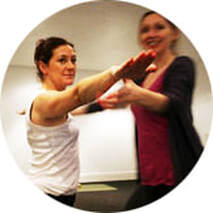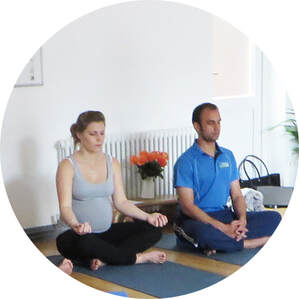 About 3 or 4 months ago a woman in her late forties joined my class who had been diagnosed with high blood pressure. She wanted to know if yoga would help and was willing to give yoga a try. She came every week, almost without fail, and enjoyed the classes. We took it gently at first, modifying postures where needed, ensuring that the practice was safe and giving her body time to get used to moving in new ways. After some practice, she took well to the ujjayi breathing, and even came to a weekend workshop to explore taking yoga further. I had a wonderful email from her this week saying she has had her high blood pressure re-tested and it is back to normal and she credits the yoga practice for this. However let's give the credit right back to her. She was motivated to do something positive to help herself with her health situation. She was ready to make changes to her lifestyle that were contributing factors to her high blood pressure (high stress and lack of exercise). She stuck with it, even though at first she saw no tangible improvement in her blood-pressure and asked how long it would take for the yoga to 'work'. She helped her health situation for herself and she now has her own reward. All of us have this ability within us to help ourselves and I'm inspired by students who come and practice the yoga teachings in their own way for their own aims. It does take perseverance; it isn't overnight. Often when we arrive at a class we are looking to improve imbalances or issues that have crept up over years or decades, and these won't be changed in a few sessions. But hopefully by finding a yoga practice that you enjoy you will enable the improvements to come. Another woman in her early thirties came to my class in December. She was a British Athlete, a snowboarder, who had suffered a serious concussion and was unable to continue her rigorous slope and gym training. With frequent, regular yoga practice, she was able to continue her physical training in a way that adapted itself to her injury. She found a sense of peace of mind and confidence. Then in February she went on to win Britain's first Olympic medal on snow. Well done Jenny Jones! Yoga is adaptable to any injury, illness or health situation. When skillfully applied, it can be a great support and help you pave your way to improvements. The tools are varied and some may be more appropriate than others - bodywork, breathwork, meditation. No matter what your situation there will be something you can do to get started. Please get in touch to find out more or read more about yoga therapy here. Back to YogaSpace homepage
0 Comments
 The debate is ongoing, should yoga be considered for the Olympic games? Yoga competitions have been held for over a century, and there are many yoga practitioners who would support the competitive yoga movement. But equally many of the teachings of yoga philosophy, and many of the reasons some are drawn to the practice of yoga, work away from the notion of it being competitive. Many people practice yoga precisely because you aren't in competition and it allows you space to escape from the daily struggle. You nurture the uncompetitive side of you, where you work at your own level, your own pace, challenging yourself to develop health, strength, mental and physical wellbeing and perhaps spiritual grounding and space. But there are many varied reasons for people to practice yoga, and for some it is largely athetic. The practice that most of us see in classes, on DVDs and in our home practice, is athletic. Physical exercises to stretch, strengthen, develop stamina and stability. This is the visible side of yoga, the performance of yoga postures (asana). The rest of the yoga teachings are largely invisible, not aimed at spectators. Teachings about attitudes, lifestyle, reflection, breath control, meditation. To sit cross-legged and see who can regulate the breathing well, or become realised and enlightened might not make great viewing! Yoga is different things to different people, and none of them need conflict. For some it is physical development and mastery, discipline, challenge, and these could all be aligned with developing the competitions of yoga into more formal Olympic Sport. It would be interesting to consider how the rules might differ from the rules of gymnatics. The development of yoga asana has been quite influenced by the physical culture of gymnastics so there is certainly cross over that would need to be carefully defined. The commercial side would have to be considered too. Yoga is big business, Bikram yoga has packaged and presented yoga into a neat and simple kit that has been rolled out globally and which affords him a forecourt full of Rolls Royces and diamond encrusted Rolexs. The posture sequence would surely complement his copyrighted sequence as he is in the forefront of promoting it as an Olympic Sport. So the motivation of Yoga as Sport and who governs the sport would need to be considered. There are pros and cons of course. - Making it into a mainstream sport could encourage participation which then may lead practitioners beyond the physical into the deeper teachings. Many have discovered the joy of yoga practice through the appeal of an athetic practice. - It could also work the other way, simplifying it and reducing it to a sport, losing too much along the way. I'm not a supporter of the Olympic Yoga movement. More and more people are discovering yoga in their own way and it seems to have momentum of its own. The practice of yoga is already more athletic than anything else in most classes. Yet the teachings and experience of a fuller yoga practice speaks for themself. Olympic yoga could easily put off those who aren't competitive. The idea of competing to be 'better' than someone else at yoga is exactly what Patanjali's Yoga Sutras, one of the essential ancient texts depicting the teachings of yoga, warn against as one of the pitfalls along the path of self development. A dead end that could take up all our energy until we realise too late that we have missed the point. Back to YogaSpace homepage Yoga is more popular than ever before but people are noticing (including Radio 4 who broadcast 'Corporate Karma' last week) how some of the traditional values and teachings of yoga are being left behind in its popularity.
When you think of yoga do you immediately think about someone doing something rather bendy that looks impossible to most of us? About the pursuit of physical health? Or do you think about sitting in meditation? About having the stability to sit and connect with something beyond your everyday persona? Yoga is innovating itself in our modern, Western world. It is becoming accessible to many by appealing to the desire to be fitter and healthier. It is becoming big business for some with brands such as Bikram Yoga and Lulu Lemon making £millions for the shareholders. But in the quest for popularity and profit, are the compromises ever going to allow yoga's true value to shine through? Physical pursuits for fitness are everywhere. Even the smallest village has a keep fit class, probably even a yoga class at the village hall once a week. In cities there are numerous yoga centres all offering an array of quick benefits and fitness promises. We are appealing to what people want. Yoga provides this but it also has far more potential than offering a quick feeling of calm and energy before heading home after a days work. This is just the tip of a rather huge iceburg. The teachings do make you feel good, we can all experience that, but that isn't by any means it. The teachings are ancient and teach about a path which if followed diligently, with a true guide, can lead to an ultimate reward far beyond any material posession or physical health. Along the way you'll learn about yourself and the world you live in. Some call it a spiritual path, which is a draw to some and offputting to others. The initial feel-good feeling is the thing that captures most of us, and that keeps us coming back for more. The days I don't practice yoga I wish I had, I'm less comfortable and less settled, and less connected with myself and the people around me. Some of yoga's teachings (not taught in the majority of classes) can seem somewhat esoteric. You might be sitting and chanting, or humming, or huffing and puffing with your breath. For us rather reserved British this is all perhaps a little uncomfortable until you get used to it. So the physical form is something we can get more readily, and feel okay with, and then perhaps the rest will come once you start to enquire a little more deeply. I should make it clear that I'm by no means knocking the appeal of the physical fitness and health through yoga, far from it. Although I'm not a supporter of the movement to add yoga as an Olympic sport, competing for who is 'best' at it (which Bikram Choudhury is a keen supporter of) - the physical postures are essential to get many people interested. It is also essential to maintain fitness and health to be strong enough to meditate. But by focusing just on the physical form, it feels a little bit like sitting on a treasure chest full of gold coins, finding a single gold coin and being entirely happy with this, blissfully unaware of the riches right beneath you. Return to YogaSpace homepage You don't immediately think of the Olympics or yoga championships when you think of yoga. But there is a small but growing movement for encouraging competition in yoga with yoga celebrities like Bikram Choudhury at the forefront of the movement.
Yoga competitions currently judge asana (postures) based on strength, flexibility, alignment, difficulty of the poses demonstrated and overall demeanour and execution. More about it in the emerging trend and Olympic Yoga aspirations in this interesting article in the Telegraph this week. The arguments against competition in yoga are relatively obvious. For a long time, and now more than ever, the tools and techniques of yoga have been used for individual development. Using bodywork, breathing, study, meditation etc. with personal aims that will be different from one person to the next. You might be at your group yoga class working on an old back injury that your yoga practice helps, the person next to you in a class may be settling an over anxious mind. How can there be a competition in this? But to reject the notion of yoga as an Olympic sport as an obviously ludicrous notion perhaps could be short-sighted. If you agree that the more people who practice yoga the better, and that the benefits to practicing yoga are widespread and adaptable and have lots to offer people from all walks of life, then it naturally follow on on from that that the more people who know about yoga the better - and what better way to get to know about it than seeing it on TV in the Olympics? Of course that is a simplistic argument, and what you would see on TV would be a range of twisted bodies doing gymnastic type moves. But it could pique curiousity, and be followed up by perhaps venturing to a yoga class to find out more about it. The onus is then on yoga teachers to gradually introduce the student in to the full range of potential that yoga has to offer. Perhaps this could inspire a new wave of people to try yoga, or perhaps it would just foster more spectator participation which really would miss the point. The physical beauty that makes up one of the aspects of yoga does deserve spectators. BKS Iyengar emphasises this in his approach to teaching as a way to encourage uptake and participation. So perhaps Olympic Yoga a natural extension of this? Patanjali would almost certainly disapprove and have no interest in this as a pursuit. In the Yoga Sutras he warns against getting caught up in the physical comforts that yoga can bring, seeing it as a big potential pitfall. But in the West the physical benefits are the typical starting point for anyone trying yoga. That is the reason for getting involved. So perhaps Olympic yoga isn't as far off as perhaps we might think it is, and not as ludicrous as it initially sounds. |
More blog articles >Categories
All
Archives
July 2024
|
|
Bristol YogaSpace Ltd
Princes Place, Bishopston Just off Gloucester Road Bristol BS7 8NP |
|



 RSS Feed
RSS Feed

